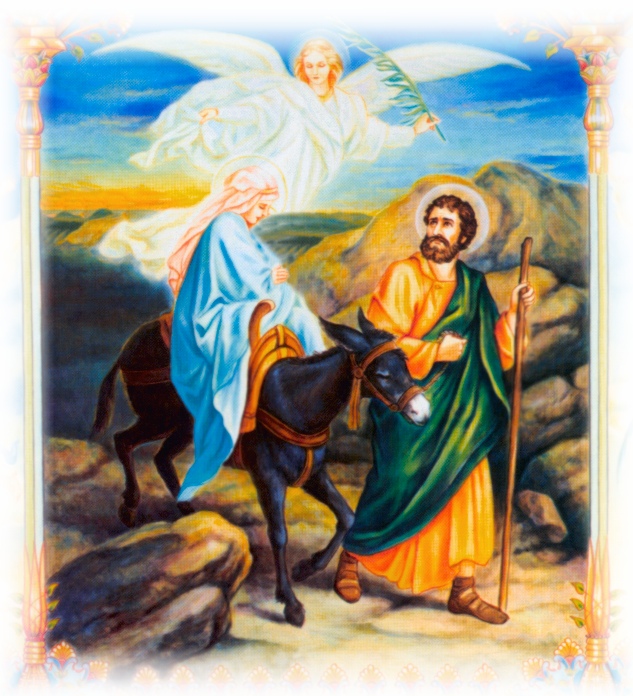
Advent

The Journey to Bethlehem
From THE MYSTICAL CITY OF GOD, Ven. Mary Agreda
TAN Books and Publishers; With Ecclesiastical Appr.
It had been decreed by the immutable will of Providence that the Only-begotten of the Father should be born in the town of Bethlehem (Mich. 5, 2), and accordingly it had been foretold by the Saints and Prophets of foregone ages (Jerem. 10, 9); for the decrees of the absolute will of God are infallible, and since nothing can resist them (Esther 13, 9), sooner would heaven and earth pass away than that they fail of accomplishment (Matt. 24, 35). The fulfillment of this immutable decree the Lord secured by means of an edict of Cæsar Augustus for the whole Roman empire, ordering the registration or enumeration of all the world, as Saint Luke says (2, 1). The Roman empire at that time embraced the greater part of what was then known of the earth and therefore they called themselves masters of the world, ignoring all the other nations. The object of this census was to make all the inhabitants acknowledge themselves as vassals of the emperor, and to pay a certain tax to their temporal lord; for this registration everyone was to go to his native city in order to be inscribed. This edict was also proclaimed in Nazareth and came to the hearing of Saint Joseph while he was on some errand. He returned to his house in sorrowful consternation and informed his heavenly Spouse of the news which had spread about concerning the edict. The most prudent Virgin answered: "Let not this edict of our temporal ruler cause thee any concern, my master and spouse, for all that happens to us is ordained by the Lord and King of Heaven and earth; and in all events His Providence will assist and direct us (Eccli. 22, 28). Let us resign ourselves into His hands and we shall not be disappointed."
Most holy Mary was capable of being entrusted with all the mysteries of her most holy Son and She knew of the prophecies and their fulfillment; hence, also, that the Only-begotten of the Father and her own was to be born in Bethlehem, a Stranger and an Unknown. But She said nothing of this to Saint Joseph; for without being commissioned by the Lord She would reveal none of His secrets. All that She was not commanded to reveal She concealed with admirable prudence, notwithstanding her desire of consoling her most faithful and holy spouse. She wished to entrust Herself to his direction and arrangement without acting the part of those who are wise in their own conceit, as Wisdom warns us (Prov. 3, 7). They therefore conferred with each other about the course to be pursued; for already the pregnancy of the heavenly Lady was far advanced and her parturition was approaching. Saint Joseph said: "Queen of heaven and earth and my Mistress, if Thou hast no order to the contrary from the Almighty, it seems to me necessary that I go alone. Yet, although this order refers only to the heads of families, I dare not leave Thee without assistance, nor could I live without Thee, nor would I have a moment's peace away from Thee; for my heart could not come to any rest without seeing Thee.
They at the same time resolved upon the day of their departure, and Joseph diligently searched in the town of Nazareth for some beast of burden to bear the Mistress of the world. He could not easily find one because so many people were going to different towns in order to fulfill the requirements of the edict of the emperor. But after much anxious inquiry Saint Joseph found an unpretentious little beast which, if we can call such creatures fortunate, was the most fortunate of all the irrational animals; since it was privileged not only to bear the Queen of all creation and the blessed fruit of her womb, the King of kings and the Lord of lords, but afterwards to be present at His Birth (Isaias 1, 3); and since it gave to its Creator the homage denied to Him by men. They provided the articles for the journey, which would last five days. The outfit of the heavenly travelers was the same as that which they had provided for their previous journey to the house of Zacharias on their visit to Elisabeth. They carried with them bread, fruit and some fishes, which ordinarily composed their nourishment. As the most prudent Virgin was enlightened regarding their protracted absence, She made use of prudent concealment in taking along the linens and clothes necessary for her heavenly delivery, for She wished to dispose all things: according to the exalted intents of the Lord and in preparation for the events which She expected. Their house they left in charge of some neighbor until they should return.
The most pure Mary and the glorious Saint Joseph departed from Nazareth for Bethlehem alone, poor and humble in the eyes of the world. None of the mortals thought more of them than what was warranted by their poverty and humility. But O the wonderful sacraments of the Most High, hidden to the proud, and unpenetrated by the wisdom of the flesh! They did not walk alone, poor or despised, but prosperous, rich and in magnificence. They were most worthy of the immense love of the eternal Father and most estimable in His eyes. They carried with them the Treasure of Heaven, the Deity itself. The whole court of the celestial ministers venerated them. All the inanimate beings recognized the living and true Ark of the Testament (Josue 3, 16) more readily than the waters of the Jordan recognized its type and shadow, when they courteously laid open and free the path for its passage and for those that followed it. They were accompanied by the ten thousand Angels, which were appointed by God Himself as the servants of her Majesty during that whole journey. These heavenly squadrons marched along as their retinue in human forms visible to the heavenly Lady, more refulgent than so many suns. She herself walked in their midst better guarded and defended than the bed of Solomon, surrounded by the sixty valiant ones of Israel, girded with their swords (Cant. 3, 7). Besides these ten thousand Angels there were many others, who descended from Heaven as messengers of the eternal Father to His Only-begotten made man in His most holy Mother, and who ascended from earth as their ambassadors with messages and treaties from them to the heavenly Father.
With these wonderful favors and delights, however, the Lord joined some hardships and inconveniences, which the Divine Mother encountered on the way. For the concourse of people in the taverns, occasioned by the imperial edict, was very disagreeable and annoying to the modest and retiring Virgin-Mother and her spouse. On account of their poverty and timid retirement they were treated with less hospitality and consideration than others, especially the well-to-do; for the world judges and usually confers its favors according to outward appearance and according to personal influence. Our holy pilgrims were obliged repeatedly to listen to sharp reprimands in the taverns, at which they arrived tired out by their journey, and in some of them they were refused admittance as worthless and despicable people. Several times they assigned to the Mistress of Heaven and earth some corner of the hallway; while at others She did not fare even so well, being obliged to retire with her husband to places still more humble and unbecoming in the estimation of the world. But in whatever places She tarried, how contemptible soever it might be considered, the courtiers of Heaven established their court around their supreme King and sovereign Queen. Immediately they surrounded and enclosed them like an impenetrable wall, securing the bridal chamber of Solomon against the terrors of the night. Her most faithful spouse Joseph, seeing the Mistress of Heaven so well guarded by the Angelic hosts, betook himself to rest and sleep; for to this She urged him on account of the hardships of travel. She, however, continued her celestial colloquies with the ten thousand Angels of her retinue.
Thus variously and wonderfully assisted, our travelers arrived at the town of Bethlehem at four o'clock of the fifth day, a Saturday. As it was at the time of the winter solstice, the sun was already sinking and the night was falling. They entered the town, and wandered through many streets in search of a lodging-house or inn for staying over night. They knocked at the doors of their acquaintances and nearer family relations; but they were admitted nowhere and in many places they met with harsh words and insults. The most modest Queen followed her spouse through the crowds of people, while he went from house to house and from door to door. Although She knew that the hearts and the houses of men were to be closed to them, and although to expose her state at her age to the public gaze was more painful to her modesty than to their failure to procure a night-lodging . . . While wandering through the streets they passed the office of the public registry and they inscribed their names and paid the fiscal tribute in order to comply with the edict and not be obliged to return. They continued their search, betaking themselves to other houses. But having already applied at more than fifty different places, they found themselves rejected and sent away from them all. The heavenly Spirits were filled with astonishment at these exalted mysteries of the Most High, which manifested the patience and meekness of His Virgin Mother and the unfeeling hardness of men. At the same time they blessed the Almighty in His works and hidden sacraments, since from that day on He began to exalt and honor poverty and humility among men.
It was nine o'clock at night when the most faithful Joseph, full of bitter and heartrending sorrow, returned to his most prudent Spouse and said: "My sweetest Lady, my heart is broken with sorrow at the thought of not only not being able to shelter Thee as Thou deservest and as I desire, but in not being able to offer Thee even any kind of protection from the weather, or a place of rest, a thing rarely or never denied to the most poor and despised in the world. No doubt Heaven, in thus allowing the hearts of men to be so unmoved as to refuse us a night-lodging conceals some mystery. I now remember, Lady, that outside the city walls there is a cave, which serves as a shelter for shepherds and their flocks. Let us seek it out; perhaps it is unoccupied, and we may there expect some assistance from Heaven, since we receive none from men on earth." The most prudent Virgin answered:
"My spouse and my master, let not thy kindest heart be afflicted because the ardent wishes which the love of thy Lord excites in thee cannot be fulfilled. Since I bear Him in my womb, let us, I beseech thee, give thanks for having disposed events in this way. The place of which thou speakest shall be most satisfactory to me. Let thy tears of sorrow be turned into tears of joy, and let us lovingly embrace poverty, which is the inestimable and precious treasure of my most holy Son. He came from Heaven in order to seek it, let us then afford Him an occasion to practice it in the joy of our souls; certainly I cannot be better delighted than to see thee procure it for me. Let us go gladly wherever the Lord shall guide us."
The holy Angels accompanied the heavenly pair, brilliantly lighting up the way, and when they arrived at the city gate they saw that the cave was forsaken and unoccupied. Full of heavenly consolation, they thanked the Lord for this favor . . .
 WORDS
OF THE QUEEN
WORDS
OF THE QUEEN
My dearest daughter, if thou art of a meek and docile heart, these mysteries which thou hast written about and hast understood, will stir within thee sweet sentiments of love and affection toward the Author of such great wonders. I wish that, bearing them in mind, thou from this day on embrace with new and great esteem the contempt and neglect of the world. And tell me, dearest, if, in exchange for this forgetfulness and scorn of the world, God look upon thee with eyes of sweetest love, why shouldst thou not buy so cheaply what is worth an infinite price? What can the world give thee, even when it esteems thee and exalts thee most? And what dost thou lose, if thou despise it? Is its favor not all vanity and deceit (Ps. 4, 3)? Is it not all a fleeting and momentary shadow, which eludes the grasp of those that haste after it? Hence, if thou hadst all worldly advantage in thy possession, what great feat would it be to despise it as of no value? Consider how little thou dost in rejecting all of it for the love of God, for mine and that of the holy Angels. And if the world does not neglect thee as much as thou shouldst desire, do thou on thy own behalf despise it, in order to remain free and unhampered to enjoy to the full extent the highest Good with the plenitude of His most delightful love and intercourse.
My most holy Son is such a faithful Lover of souls that He hast set me as the teacher and living example of the love of humility and true contempt of worldly vanity and pride. He ordained also for His Own glory as well as for my sake that I, His Servant and Mother, should be left without shelter and be turned away by mortals, in order that afterwards His beloved souls might be so much the more readily induced to offer Him a welcome, thus obliging Him, by an artifice of love, to come and remain with them. He also sought destitution and poverty, not because He had any need of them for bringing the practice of virtues to the highest perfection, but in order to teach mortals the shortest and surest way for reaching the heights of Divine love and union with God.
Thou knowest well, my dearest, that thou hast been incessantly instructed and exhorted by Divine enlightenment to forget the terrestrial and visible and to gird thyself with fortitude (Prov. 31, 17), to raise thyself to the imitation of me, copying in thyself, according to thy capacity, the works and virtues manifested to thee in my life. This is the very first purpose of the knowledge which thou receivest in writing this history; for thou hast in me a perfect model, and by it thou canst arrange the converse and conduct of thy life in the same manner as I arranged mine in imitation of my sweetest Son. The dread with which this command to imitate me has inspired thee as a being above thy strength, thou must moderate and thou must encourage thyself by the words of my most holy Son in the Gospel of Saint Matthew: "Be ye perfect as My heavenly Father is perfect" (5, 8). This command of the Most High imposed upon His holy Church is not impossible of fulfillment, and, if His faithful children on their part dispose themselves properly, He will deny to none of them the grace of attaining His resemblance to the heavenly Father. All this my most holy Son has merited for them. But the degrading forgetfulness and neglect of men hinder them from maturing within themselves the fruits of His Redemption.
Of thee particularly I expect this perfection, and I invite thee to it
by the sweet law of love which accompanies my instruction. Ponder and
scrutinize,
by the Divine light, the obligation under which I place thee, and labor
to correspond with it like a faithful and anxious child. Let no
difficulty
or hardship disturb thee, nor deter thee from any virtuous exercise, no
matter how hard it may be. Nor be content with striving after the love
of God and salvation of thyself alone; if thou wouldst be perfect in
imitating
me and fulfilling all that the Gospel teaches, thou must work for the
salvation
of other souls and the exaltation of the holy name of my Son, making
thyself
an instrument in His powerful hands for the accomplishment of mighty
works
to advance His pleasure and glory.


HOME-----------------------------------------------------OUR LADY
www.catholictradition.org/Advent/advent15.htm